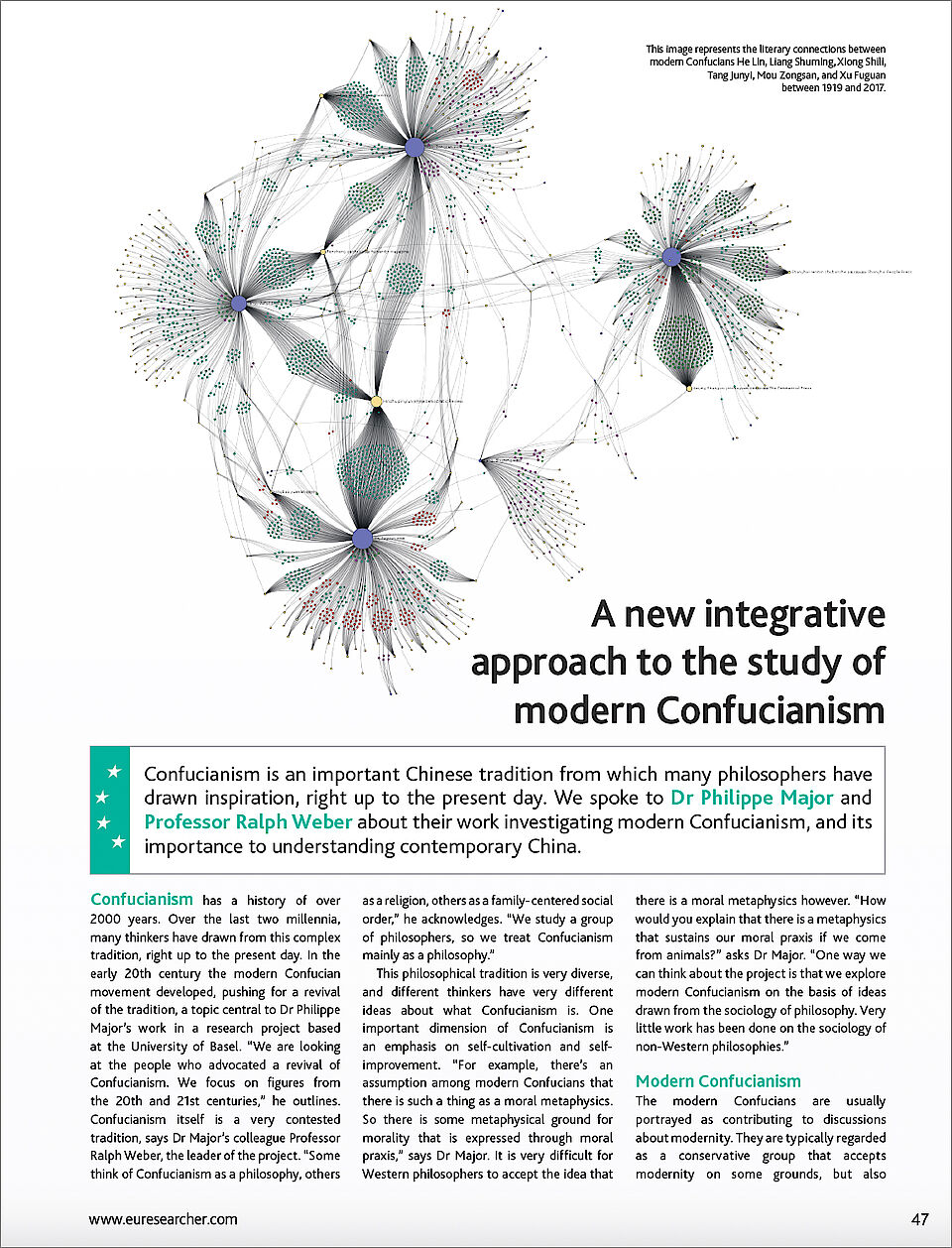The Exterior of Philosophy: On the Practice of New Confucianism
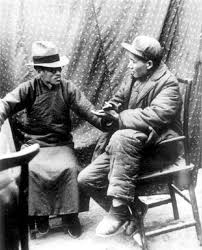
New Confucian scholar Liang Shuming 梁漱溟 (1893-1988; left) pays a visit to Mao Zedong 毛澤東 (1893-1976; right) in Yan’an in January 1938. Although the two had met for the first time in 1918 at a mutual friend’s house in Beijing, they did not exchange their views on China until the 1938 meetings. The two met again in Yan’an in 1946, and repeatedly in Beijing after 1950, during which year Liang had moved to the capital at the invitation of Mao and Zhou Enlai 周恩来 (1898-1976). Liang personally reported to Mao his assessment of the land reforms from 1950 until a public falling-out took place between the two in September 1953.* Photo: http://bbs.creaders.net/politics/bbsviewer.php?trd_id=1252989
Project Leader: Prof. Dr. Ralph Weber
Team:Dr. Philippe Major, Yvonne Yim Fong Chan, Milan Matthiesen
This research project looks at the practice of twentieth and twenty-first century modern Confucian philosophy and its entanglements with a series of local and global challenges. Adopting Sociology of Philosophy perspectives, The Exterior of Philosophy situates modern Confucian philosophical practices in the socio-political contexts in which they evolved, paying particular attention to a number of challenges and developments that are at one and the same time local and global in scope. This includes both political challenges (the rise of Marxism and the CCP, the retreat of the GMD to Taiwan and its instrumentalization of ”Confucianism,” the lasting intellectual heritage of liberalism, the problem of totalitarianism, the threat of imperialism) and social developments (the abolition of the imperial examination system in 1905, the introduction of new institutions such as the university system, the specialization and professionalization of academic work, the growing debates surrounding gender equality, etc.) that directly bear onto the philosophical field. Such entangled socio-political challenges represent, in the context of this research project, constituting factors of philosophical practices (often mediated by the philosophical field) as well as some of the more pressing issues with which modern Confucian philosophies engage. The research project thus considers philosophical practice itself as a social act that is both constrained and enabled by what philosophers often consider the ”exterior of philosophy”: i.e., the socio-political ”context.”
Project Aims
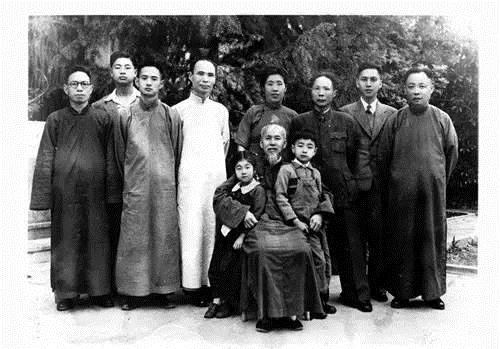
New Confucian philosopher Xiong Shili 熊十力 (1885-1968; center front) meets with his students in Shanghai on his way to Hankou in September 1946. Included in the picture, which was taken at one of his students’ house, are famed New Confucians Mou Zongsan 牟宗三 (1909-1995; first from the left) and Xu Fuguan 徐復觀 (1904?-1982; third from the right).* Photo: https://kknews.cc/history/p2y23ae.html
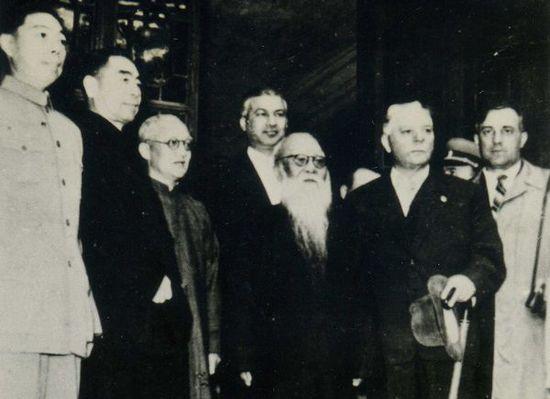
New Confucian intellectual Ma Yifu 馬一浮 (1883-1967; center front) is visited by Zhejiang Province Governor Sha Wenhan 沙文漢 (1908-1964; first from the left), Foreign Minister Zhou Enlai (second from the left), friend Jiang Guobang 蔣國榜 (1893-1970; third from the left), and Soviet Union Head of State Kliment Voroshilov (1881-1969; second from the right). This picture was taken in May 1957 at the Jiang villa (蔣莊) on the famous West lake in Hangzhou, where Ma lived, at the invitation of Jiang Guobang, from 1950 until the Red Guards evicted him from the villa in August 1966.* Photo: https://kknews.cc/culture/jz38j26.html
One of the largest research groups specialized in the study of modern Confucianism outside of East Asia, The Exterior of Philosophy seeks to provide new perspectives on modern Confucianism by deploying sociological approaches for philosophical aims. Since the beginning of this century, modern Confucianism has received growing attention in European-language scholarship. The existing scholarship, however, has for the most part adopted approaches that are either historical, as in the genre of intellectual history, or philosophical, tuned towards showing the contemporary philosophical relevance of modern Confucianism. Building on these studies, the current project seeks to offer new perspectives by borrowing from the literature on the Sociology of Philosophy, while also examining the potential of such perspectives for markedly philosophical readings of modern Confucianism.
The project breaks new grounds at two distinct levels. First, The Exterior of Philosophy aims at exploring the possibilities of a Sociology of Philosophy approached as a philosophical sub-discipline. Can Sociology of Philosophy approaches open new perspectives on the philosophical enterprise as a social praxis? Can they help philosophers reflect on the social conditions of possibility of their own work, and thus contribute to a metaphilosophical project aimed at providing descriptive rather than prescriptive answers to the perennial question of ”what philosophy is”? Can sociology of philosophy perspectives on modern Confucianism reveal some of the social conditions that both limit and enable philosophical practice outside the hegemonic centres of knowledge production? Can modern Confucian philosophical practice be interpreted as engaged in the kind of union of knowledge and action (zhixing heyi 知行合一) advocated by Wang Yangming (王陽明) and his followers, and if so, can we learn something regarding the entanglements of philosophy with the socio-political from it?
Second, at the level of modern Confucian studies, the project explores modern Confucian philosophy's embeddedness in, and relations with, the socio-political by drawing from the work of Sociologists of Philosophy Pierre Bourdieu, Martin Kusch, Randall Collins, and Matthew Chew, among others. In contrast to epiphenomenalist readings of philosophy provided by vulgar Marxism, sociologists of philosophy argue that the entanglements between the macro-level of the socio-economic and political spheres with the micro-level of philosophical practice are mediated by the meso-level of the philosophical field. Bourdieu, for example, reads Heidegger’s work as an equivalent, in the field of philosophy, of the Conservative Revolution of the Weimar period in the political sphere. Of central importance to this project will be the question of whether and how the theoretical work of sociologists engaged in the study of the Euro-American philosophical field can be applied to the different locales under study (PRC, Hong Kong, Taiwan, Singapore, the United States, etc.). In the different settings in which modern Confucians have evolved, is philosophy equally consolidated as a relatively autonomous field with a distinct doxa, i.e., ”a set of inseparably cognitive and evaluative presuppositions whose acceptance is implied in membership itself” (Bourdieu, Pascalian Meditations, 100)? Or is philosophical practice, at least in some of these locales, directly shaped by socio-political factors, without the mediating effects of the philosophical field? How is the philosophical doxa defined in these settings? How significant a role does boundary-work play in the process of consolidating the doxa? How is modern Confucian philosophical practice constituted by the philosophical field and its doxa, and how does it attempt to reshape the latter? How do modern Confucians relate to their society and to the political centres of power?
The project breaks down into five distinct studies on the exterior of philosophy – that is, the sociological foundation upon which philosophy is conducted – and its relevance for the practice of modern Confucianism. The sociological starting points vary among the five studies, as does the place of action. The emphasis in the postdoctoral project, conducted by Philippe Major, is on the practice of writing modern Confucian philosophy as a means to create imagined communities of authors and readers, whereby the historical society stands for both a condition that is constitutive and a limitation that is to be transcended. The first doctoral project, by Yim Fong Chan, studies the philosophical work of those modern Confucians who stayed on the mainland after the establishment of the PRC in 1949, paying particular attention to the entanglements between philosophy and politics during this period. The second doctoral project, by Milan Matthiesen, takes as its starting point the anti-Confucian criticism of Liberals in 1950s Taiwan and Hong Kong, emphasizing how the critics use social and political agendas that are not straightforwardly philosophical when trying to debunk modern Confucianism and advance philosophical arguments. Finally, two research projects will be conducted by Ralph Weber: one aimed at providing a new perspective on Tu Weiming's social and political thought by looking at it from the perspective of Tu's cosmopolitan engagement both in the academic setting and the larger socio-political sphere, and one that seeks to challenge established narratives about ”New Confucianism” by looking at social factors usually relegated to the ”exterior of philosophy.”
In sum, The Exterior of Philosophy promises a threefold scientific impact by contributing to the establishment of a philosophical Sociology of Philosophy, by adding further scholarship to the thriving field of non-European philosophy, and by introducing a new integrative approach to the study of modern Confucianism.
Digital Humanities Project: Mapping New Confucian Networks (1911–2021)
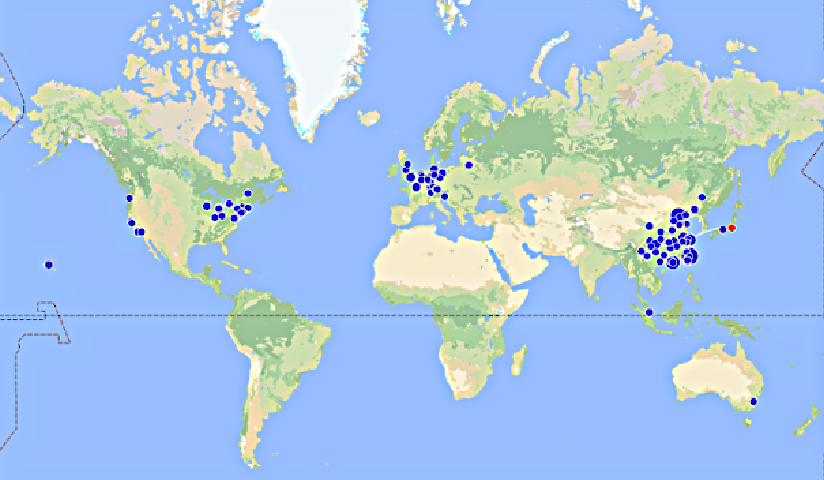
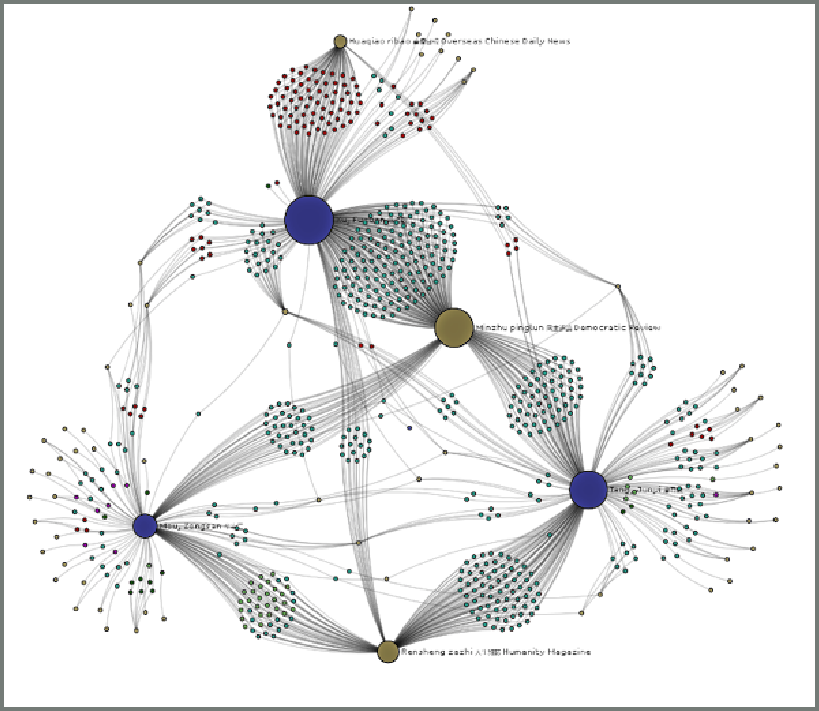
The research group is also involved in the Digital Humanities project "Mapping New Confucian Networks (1911–2011)." The database project maps the networks of New Confucian intellectuals from the beginning of the 20th century to the current day. It focuses on their relations (1) with other New Confucians, (2) with other intellectuals (liberals, marxists, etc.), (3) with political figures, and (4) with institutions, such as universities, research associations, journals, newspapers, political parties, etc. The relational database will serve as a reference tool and a research tool and will lead to the creation of an open-source bilingual website freely accessible to researchers and the interested public worldwide.
As a reference tool, the database will offer the only available source of information detailing the full list of publications of the New Confucians, their institutional associations, the events in which they participated, their location through time, etc. As a research tool, the database promises to answer many questions that have been of central importance in the field of New Confucian studies (e.g.: when and where did a cohesive "New Confucian movement" emerge?) but that remain unanswered to this day due to the absence of centralized empirical data. Moreover, we expect the database to raise new questions, notably about the New Confucians' relations to political power, the role of women in the movement, and the general development of post-war intellectual circles in Taiwan and Hong Kong, to which insufficient attention has been paid thus far in the field.
* Despite intensive research, we were not able to retrieve all copyright holders for the images. We kindly ask any right holders or legal successors to contact us directly
Subprojects
Philosophical Textuality as Social Praxis in Modern Confucianism
Drawing from the Sociology of Philosophy of Pierre Bourdieu, Imagining Confucian China aims at providing a new interpretation of modern Confucian philosophical textuality as a social act. Until now, modern Confucian texts have mostly been approached from historical or philosophical perspectives; perspectives that tend to treat texts as a medium through which the actual object of study (philosophical ideas or historical realities) can be accessed. Building on the existing literature, the goal of this project is to focus on philosophical textuality itself, but understood as a social praxis – i.e., as a praxis that takes place in the social realm and that aims at producing social changes. This project takes a closer look at how Modern Confucian philosophical textuality functions as a symbolic site wherein imagined communities can be established in writing and enacted in the relation between author, text, and reader, whereas the historical society in which the texts are written represents both a condition that is constitutive and a limitation that is to be transcended.
Imagining Confucian China analyses texts written in the 1950s and 1960s outside of the PRC, such as the so-called ”New Confucian Manifesto” (1958), Tang Junyi's (唐君毅) Cultural Consciousness and Moral Reason (文化意識與道德理性; 1958), and Mou Zongsan's (牟宗三) Substance of the Heart-mind and Substance of Human Nature (心體與性體; 1968–1969). Building on Bourdieu's notion of ”dual reading,” the project reads modern Confucian texts as belonging to two distinct social spaces: the meso-level of the philosophical field and the macro-level of the socio-political sphere. At the meso-level, the project argues that the texts conceal a double agenda: first to legitimize their inclusion in the established doxa of the philosophical field, and second to redefine this doxa around their own understanding of Confucian philosophy, shaped by their desire to establish an imagined community of Confucian sages and worthies.
At the socio-political level, the project argues that the texts make use of idealist philosophical positions in order not only to challenge the legitimacy of the Chinese Communist Party, but also to symbolically purify themselves from the socio-political context. The texts then set out to symbolically establish an alternative ”China” in writing, shaped around an imagined community of Confucian sages and worthies no longer restricted and confined by the social and the historical. By ”embodying” sagehood, the texts can reinstate the social status of the Confucian literatus in the imagined community enacted in the relation between author and reader, and thus reverse the actual fate of the authors who were rather marginalized from the centres of power. Despite the texts' claim to embody sagely transcendence from the limitations of the social, however, Imagining Confucian China argues the texts can nevertheless be understood as social acts: acts that must conform to expectations of the philosophical field in their very attempt at reforming it, and acts that are subjected to the socio-political order even as they try to reverse it.
By looking at modern Confucian philosophical textuality as a social praxis taking place in between the philosophical field and the socio-political sphere, the research project’s goal is dual. First, it seeks to rethink modern Confucian texts as a symbolic equivalent, in the philosophical field, of a socio-political attempt at reinstating the authority of the Confucian sage-king (in this case by fusing it with the figure of the philosopher). Second, borrowing from the work of Martin Kusch on boundary-work in the philosophical field, the project inquires into the possibility of deploying Sociology of Philosophy as a contribution to the field of metaphilosophy, understood here as a descriptive rather than prescriptive study of the social conditions that inform philosophical practice outside the hegemonic centres of knowledge production.
Liang Shuming and Feng Youlan in the PRC (1949-1976)
The exterior of philosophy in the second project concerns the philosophical writings that were produced under an extreme political condition. The focus is here set on the specific period after the CCP took control of the Chinese mainland in 1949 and until the end of Mao's era. Whereas there has been very productive research on those New Confucian philosophers who fled to Hong Kong and Taiwan, the writings of those who stayed on the mainland are largely neglected. In this project, the cases of Liang Shuming (梁漱溟) and Feng Youlan (馮友蘭) are studied comparatively. Their writings and activities during Mao's period will be examined so as to reveal how their views of and relation with the Chinese Communist Party and Mao's leadership evolved after 1949. Given the fact that they had already established their system of thought and upheld Confucian values before the founding of the PRC, these values should be deeply rooted in their self-identity. They should have their specific reasons for choosing to stay on the mainland, and for accommodating themselves to the Marxist ideology. However, due to the incompatibility between this ideology and their original Confucian (and Buddhist) values, intellectual struggles and conflicts appeared in the form of inconsistencies and contradictions in their writings. This study thus focuses on highlighting the inconsistency and contradictions in their works of this period, and on suggesting reasons that explain such contradictions. Besides, their reactions to the centre of power during different political movements will also be studied as a reflection of their thought.
The third project pursues a twofold aim. First, the project aims to analyse the influence of Liberal critique on the reformulation and development of Modern Confucianism during the 1950s in Hong Kong and Taiwan. It further examines the emergence and solidification of ”Liberals” and ”Confucians” in Taiwan and Hong Kong as two distinct but co-constitutive intellectual groups. Second, by employing three different approaches, the project explores the constitutive aspect of methodology.
Utilising R. Collins's and P. Bourdieu's sociology of philosophy approach, the first part of the project analyses structural changes in the academic field during the 1950s in Taiwan and Hong Kong. The debate between Confucians and Liberals that ensued a harsh critique of the Liberal Jin Yuelin by the Confucian Mou Zongsan in 1952 is analysed as a foundational moment for the emergence of Modern Confucianism as an academic and intellectual group identity. Uprooted at the beginning of the century by the downfall of the Imperial Examination System, formerly the institutional backbone of Confucianism, and challenged by Marxism as well as Liberalism, Confucianism had to find new spaces in society and academia, whose boundaries were in contest during the debates. Following the methodology of the contextual or problem-centred approach of Q. Skinner and R. G. Collingwood, the second part analyses the debates through the lens of authorial intention. Texts published during the debates are not merely read as part of an abstract philosophical dispute, but as an intervention also addressing societal and political issues through philosophical arguments. The Liberals' critique that Confucianism represents an obstruction to the development of liberal democracy in China is therefore also interpreted as a critique towards the Confucians' close ties to the KMT rulership in Taiwan.
The final part of the project explores the possibilities of a Sociology of Philosophy for Philosophy. Often understood as mere ancillary sciences, the Sociology of Philosophy and the contextual approach developed by Skinner are deprived of their philosophical value. The project investigates the possibility to understand philosophy as an answer to specific questions raised by a variety of factors, be they social, historic, or discursive. Historical approaches towards philosophy hereby play an integral role in philosophical analyses as they enable us to relate and compare philosophical answers based on the questions they attempted to solve. To elucidate this point, the project connects Modern Confucian arguments with Post-Holocaust ethics developed after WWII in Europe and the US. Especially, the Confucians' critique towards Liberalism and Communism as inherently tending towards totalitarianism due to their substitution of morality by science is brought into comparison with the way Euro-American philosophers understood the horrors of Auschwitz as a culmination of the modern trend towards a totalizing rationalism ultimately negating moral deliberations. The project therefore also aims at contributing to the field of Comparative Philosophy by working on an approach that brings together history and philosophy.
The goal of this short monograph is to give an overview of New Confucianism that is historically informed and illustrative of a sociology of philosophy approach, while being accessible to the general reader. Different from existing scholarship which retraces the ”movement” from an internal viewpoint, this project will pursue additional external and global perspectives.
A Sociological Reading
This is a monograph that presents the results of research undertaken in the last fifteen to twenty years. The volume will combine a comprehensive exposition of Tu Weiming’s social and political thought with specialized studies deploying a markedly sociological reading of his Confucian philosophy.
Activities
Workshop: "Boundaries (of the field) of philosophy: the case of the Chinese-speaking world"
Presentations:
- "The Exterior of Philosophy? Toward a Sociology of Modern Confucian Philosophy" (Ralph Weber and Philippe Major)
- "Mapping Modern Confucian Networks (1911-2011)" (Yim Fong Chan and Milan Matthiesen)
4th Biennial Conference of the European Association for Chinese Philosophy (EACP)
Panel: “Reinterpreting the Reinvention of Confucianism in the Modern Period: Sociology of Philosophy Perspectives”
(Ralph Weber, Philippe Major, Yim Fong Chan and Milan Matthiesen)
Time: 24 May 2023, 10:00 to 12:00
Time: 5 May 2023, 14:00 to 15:30
Place: Pavillon (Seminar room 00.022)
Title: How to Theorise for Contemporary ‘Non-Western’ Life-Words? Normative Hybridity as Methodological Approach for Political Theory Building
About the Workshop:
How to develop normative political models for contemporary ‘non-Western’ societies while avoiding coloniality and Eurocentrism? This critical question will be addressed by Elena Ziliotti, Assistant Professor of Ethics and Political Philosophy at TU Delft. European-derived norms and practices have influenced ‘non-Western’ societies so profoundly that they have irreversibly altered their ways of life. This has created unique forms of cultural hybridity, new intellectual and cultural practices incommensurable to both Western and pre-modern indigenous traditions.
Elena Ziliotti argues that the incommensurability of contemporary ‘non-Western’ life-worlds poses a methodological challenge for theory building. On the one hand, political theorists must avoid reproducing Eurocentrism. Still, they cannot refuse to engage with the Western-originated concepts and ways of thinking that have become fundamental in local public culture. On the other hand, pre-modern indigenous intellectual resources are a distinctive aspect of ‘non-Western’ contemporary societies, but their conceptual and epistemic retrieval alone is inadequate to ground contemporary theory.
Theorists can overcome this two-fold methodological problem by adopting ‘normative hybridity’ as methodological footing. Normative hybridity suggests that hybridity is not only a feature of the political theorist’s context of reference, but should also be her modus operandi. Ziliotti shows that normative hybridity overcomes some of the limitations of methodological proposals suggested recently (Okeja 2022; Getachew and Mantena 2022). Furthermore, drawing from works in contemporary Confucian democratic theory, she illustrates three promising methods to apply normative hybridity to theory building: ‘Internal conceptual reconstruction’ (Kim 2016; Herr 2010; Tan 2016), ‘Weak normative twining’ (Tan 2003), and ‘Strong normative twining’ (Chan 2013).
Panel: "Mapping Modern Confucian Networks (1911–2021)"
24th Biennial Conference of the European Association for Chinese Studies (EACS)
Panel: "Elitism in Modern Confucian Philosophy: Sociohistorical Perspectives".
Papers:
- Philippe Major: "The Two Truths of Social Distinctions: 'Ordinary People' in Xiong Shili’s New Treatise on the Uniqueness of Consciousness"
- Yim Fong Chan: "Attempting to Realize the Confucian Ideal: Liang Shuming’s Scholar-Official Mentality and Confucian Elitism"
- Milan Matthiesen: "Confucianism = Elitism? Evaluating the Work of Mou Zongsan"
Université Paris 1 Panthéon-Sorbonne
Presentation:
"Modern Confucian Images of the 'West': On the 'New Confucian Manifesto' (1958)" (Philippe Major)
"Chinese Philosophy: Paths between Convergence and Divergence"
Paper Presentation:
"Philosophers as Problem-solvers - A Global Philosophical Approach to Mou Zongsan and Post-Holocaust Ethics" (Milan Matthiesen)
Annual Meeting, San Antonio, Texas, and online
Roundtable: Eyal Aviv’s "Differentiating the Pearl from the Fish-Eye: Ouyang Jingwu and the Revival of Scholastic Buddhism"
Presiding: Jingjing Li, Leiden University
Panelists:
- Ernest Brewster, Iona College
- Barbra R. Clayton, Mount Allison University
- Ching Keng, National Chengchi University
- Rongdao Lai, McGill University
- Jessica Zu, Princeton University
- Philippe Major, University of Basel
Responding: Eyal Aviv, George Washington University
"The Other in Chinese History and Thought: Territory, Race, Culture, Philosophy, Religion," Ghent University (Belgium), Online
Paper Presentations:
- "Imagining Confucian China: Othering Processes in the 'New Confucian Manifesto'" (Philippe Major)
- "The West, Communism, and the Jew: Mou Zongsan’s Use of the Other in his Political Writings" (Milan Matthiesen)
Paper Presentation: "The Emergence of the Public Intellectual in the Sinophone World" (Milan Matthiesen)
23rd Biennial Conference of the European Association for Chinese Studies (EACS)
Presentations:
- "A Sociological Reading of Tu Weiming’s Philosophical Discussion of 'Multiple Modernities'" (Ralph Weber)
- "A Doxa in the Making: A Bourdieusian Reading of the New Confucian Manifesto" (Philippe Major)
University of Bern
Project Presentation: "The Exterior of Philosophy: On the Practice of New Confucianism" (Milan Matthiesen)
EACP Online Event
Participants: Ralph Weber, Philippe Major, Chan Yim Fong and Milan Matthiesen.
Short introduction: While European-language scholarship on Modern Confucianism has been steadily expanding for the last 20 years, the approaches adopted in the field have remained for the most part either philosophical or historical. Building on the strengths of such approaches, the workshop will argue for an opening up of new and/or interdisciplinary perspectives by focusing on the value of a digital humanities approach to Modern Confucianism. Situated in the broader framework of a Sociology of Modern Confucian Philosophy, a digital humanities approach has the potential to reveal new and unforeseen perspectives on Modern Confucian Philosophy.
Participant: Ralph Weber.
The talk was part of a virtual symposium on "Conversations on Chinese Philosophy" organized by The Centre for East Asian Studies of the Università degli Studi di Napoli "L'Orientale" and the Institute of Humanities of Tallinn University.
”Sociologies of modern Chinese philosophy”
Centre for East Asian and Comparative Philosophy, City University of Hong Kong (Hong Kong)
Papers presented:
Ralph Weber, ”The Social and Political Thought of Tu Weiming: A Sociological Reading.”
Philippe Major, ”Imagining Confucian China: Philosophical Textuality as Social Praxis in Modern Confucianism.”
Milan Matthiesen, ”The Politics of Anti-Confucianism and Philosophical Argument: The Debates between Confucians and Liberals in the 1950s.”
Yim Fong Chan, ”Twisted Souls in Confucianism: Liang Shuming and Feng Youlan in the PRC (1949-1976).”
«The Political and Social Thought of Mou Zongsan (1909-1995)»
Peng Guoxiang is a Qiushi Distinguished Professor of Philosophy in the School of Humanities of Zhejiang University. His talk will be followed by a workshop.
«Confucius and Correct Naming: the Emergence of a Modern Hype»
Carine Defoort is a Professor in the Department of Sinology of KU Leuven. Her talk will be followed by a workshop.
«The Society of New Confucianism: Hermeneutical Strategies of Contextualization and Evasion in the work of Mou Zongsan»
Ady Van den Stock is a postdoc fellow at the Department of Languages and Cultures of Ghent University. His talk will be followed by a workshop.
«Why is Kang Youwei Relevant to the Study of Chinese Philosophy?»
Lee Ting-mien is Assistant Professor in the Philosophy and Religious Studies Programme of the Faculty of Arts and Humanities at the University of Macau. Her talk will be followed by a workshop.
«From Metaphysics to Dialectical Materialism: Feng Youlan and Chinese Communism»
Diana Xiaoqing Lin is Professor of History at Indiana University Northwest. Her talk will be followed by a workshop.
Symposium in Honor of Prof. Tu Weiming's 80th Birthday
Paper to present:
Ralph Weber, “A Sociological Reading of Tu Weiming’s Philosophy”
«Kang Youwei (1858-1927): A Chinese Witness of the Young Turk Revolution»
Giray Fidan is an Associate Professor in the Department of Translation and Cultural Studies at Gazi University, Ankara. His talk will be followed by a workshop.
«Kang Youwei’s Travelogues as a Sociological Source for Understanding his Philosophy»
Giray Fidan is an Associate Professor in the Department of Translation and Cultural Studies at Gazi University, Ankara.
Ghent University (Belgium)
Paper to present:
Ralph Weber, “A Sociological Reading of Tu Weiming’s Philosophy”
Institute of Chinese Literature and Philosophy, Academia Sinica (Taiwan)
Paper to present:
Philippe Major, 《梁漱溟與唐君毅的文化觀》 (provisional title)
Institute for European Global Studies
«Confucian Democracy Beyond the Pluralism Dilemma»
Kim Sungmoon is Professor of Political Theory and Director of the Center for East Asian and Comparative Philosophy at Chinese University of Hong Kong
University of Bern (Switzerland)
Papers to be presented:
Ralph Weber, “Huang Zongxi’s Critique of Fellow Confucians as Failed Advisors”
Abstract: The first chapter of the famous Mingyi daifang lu 明夷待訪錄 by Huang Zongxi 黃宗羲 (1610–1695) is often read as a Confucian critique of the selfish autocratic ruler. In my paper, I will first seek to establish a different reading of the first chapter, using the reflexive hermeneutical approach developed by Paul Ricoeur and arguing that Huang is at least as much after criticizing his fellow Confucians, whom he considers to be “petty Confucians” and quintessentially failed advisors. I will then engage in additional interpretative methods (looking, among else, at Huang’s biography, his oeuvre, the qualified intentions of the text according to Skinner’s Cambridge approach) in order to corroborate, specify or refute my initial reading.
Philippe Major, “Philosophical Textuality between Heaven and Earth: Reading Tang Junyi”
Abstract: Thus far, New Confucian texts have generally been approached from philosophical or historical perspectives. While philosophical approaches tend to view texts as a medium through which the author more or less disinterestedly presents his or her ideas, historical approaches usually regard texts as sources from which one can get a better grasp of the historical author or epoch. In both cases, textuality is regarded as a medium through which access to something of greater importance – philosophical ideas or historical realities – can be granted.
In this talk, I wish to problematize our conception of philosophical texts, at least as it pertains to New Confucianism, by taking a closer look at the way philosophical textuality is depicted and employed by Tang Junyi (唐君毅) in his work Cultural Consciousness and Moral Rationality (文化意識與道德理性; 1958). I first look at the text’s remarks on textuality and philosophy, which I treat as implicit metacommentaries, before providing an account of Tang’s use of philosophical textuality as filling in the gap between philosophical knowledge (understood as ideality) and reality, or Heaven (天) and earth (地).
On the one hand, Tang regards writing and language as means to communicate with the spiritual realm. That is, language enables one to communicate what Tang calls the transcendent self, a universal mind which is not properly one’s own, but is rather shared with every single human being. To the extent that the transcendent self is entirely autonomous from socio-historical contingencies, language that expresses it is also viewed as belonging to a realm of ideality which, in theory, no longer bears the mark of social reality.
On the other hand, however, Tang regards philosophy as a dialectical process enabling our acting on the world, whose ultimate goal is to gradually reshape reality in the image of the ideality voiced by the transcendent self. Philosophical textuality thus sits in between Heaven and earth, allowing a dialogue between the two, and entrusting to the community of readers the sacred task of making the ideal real; of changing the world by following the blueprint offered by the text. The text, within such an understanding, can be seen as a decree from Heaven, or at least its interpreter, the philosopher/sage.
One of the goals of this discourse, I suggest, is to provide a symbolic purification of the author and reader from the limitations of social realities, by creating parallel and symbolic societies in writing. Within such an understanding of philosophical textuality, the philosopher plays the role of a symbolic emperor entrusted with the authorities of the mandate of Heaven (the realm of ideality Tang is said to have accessed through enlightenment) and tradition (Tang inherits the Confucian task of completing the universe by reshaping the human and the earth in the form of Heaven). I argue that despite its regarding philosophical textuality as autonomous from the social, however, the text betrays a social desire to reinstate the authority of the Confucian sage in the image of imperial polity.
“When China Faces the World: Engagement or Disengagement? Marking the Centenary Anniversary of the May 4th Movement”
Nordic Association for China Studies Conference 2019
Bergen (Norway)
Two panels (co-organized with Geir Sigurdsson) on “Why Study New Confucianism Today? – A Chinese Studies' Perspective”
Abstract: In recent years, research on New Confucianism (xin rujia/xin ruxue) has noticeably surged in European and American centres of learning. The focus has been largely set on figures such as Xiong Shili, Liang Shuming, Mou Zongsan, Tang Junyi, and Tu Weiming and particularly but not exclusively on the philosophical merit of their writings. In this panel, we bring together a group of scholars who have studied New Confucianism from a variety of perspectives and with different academic interests in view. Each scholar will step back from specific research interests and offer a reflection on why she or he believes New Confucianism is more generally worthy of being studied today. The panel's ambition is to present a spectrum of different and hopefully controversial views on the relevance of the study of New Confucianism today, which is not necessarily restricted to its purely philosophical value, but ventures into reflections that critically include broader social, political and perhaps economical concerns. The aim is to bring the interdisciplinary setup of Chinese Studies to bear on a nuanced discussion on the relevance of New Confucianism against the background of contemporary debates about whether to engage or disengage with China.
Papers to be presented:
Philippe Major, “A Manifesto for the Re-appraisal of New Confucianism”
Abstract: Published in 1958, the New Confucian Manifesto purports to address a particular readership: that of Sinologists working in the “West.” One of the central claims around which the Manifesto is structured is the idea that to understand Chinese culture properly, one must immerse oneself in it and study it from the inside. In this talk, I propose that to better understand the New Confucian movement – assuming for a moment that such a movement there is – we should do precisely the opposite of what the Manifesto proposes: we should look at New Confucianism from the outside. I will suggest that too often, scholarship on New Confucianism has read the texts on their own terms, that is as disembodied philosophical treatises partaking in a global philosophical dialogue. While I recognize the potential value of such an approach, it has had for consequence a certain tendency to ignore aspects of the movement that are not strictly philosophical; whether these aspects be political, religious, and/or sociological. In opposition to a rather decontextualized philosophical method, I will propose an alternative approach – understood as one possibility among others – centred on a sociological reading of New Confucian philosophical textuality. By situating New Confucian texts in between the social realm and the symbolic society of readers and authors established in writing, and by understanding philosophical textuality as a state of tension between the particular and the universal, I suggest that new dimensions of New Confucianism will emerge; new dimensions that question our very understanding not only of the movement itself, but also of the hegemonic struggles that structure the philosophical field.
Ralph Weber, “The Philosophical (Ir-)Relevance of Anything: Choices of Detour and Appropriation in the Study of Modern Confucianism”
Abstract: In this presentation, I want to distinguish specific and general reasons why Modern Confucianism should be studied today. I will offer what might strike others as a paradoxical argument and demand more sociological and historical inquiries into New Confucian philosophy in order to ensure that the most philosophically relevant reading may emerge. These necessary detours do not work against the act of philosophical appropriation, but enable it – as hermeneutical philosophers from Gadamer to Ricoeur have long known. Avoiding the danger of falling into the trap of subjectivism, a constructive use of the interdisciplinary setup of Chinese Studies might be called for. I will offer examples based on the study of third generation New Confucian Tu Weiming. In the end, I will raise a concern that Philip Kitcher has expressed a few years back in his seminal article on “Philosophy Inside Out” (Metaphilosophy 2011), which will allow me to discuss the philosophical relevance and/or irrelevance of anything, including Modern Confucianism.
Paper to be presented:
Philippe Major, “Chen Duxiu’s May Fourth Between Utopia and Dystopia”
Antonio de Caro (Hong Kong Baptist University): “The ethics of self-cultivation and cosmogony between neo-Confucianism and Jesuit spirituality during late Qing dynasty: The Case of Angelo Zottoli (Chao Deli 晁德蒞)”, Institute for European Global Studies.
Publications
Philippe Major, Confucian Iconoclasm: Textual Authority, Modern Confucianism, and the Politics of Antitradition in Republican China. Albany: State University of New York Press, 2023.
Yim Fong Chan, ”Liang under Mao: The Reconciliation of Confucianism and Buddhism with Marxist Ideology,” in The Dao Companion to Liang Shuming's Philosophy, edited by Thierry Meynard and Philippe Major, 225–254. Cham: Springer, 2023.
Philippe Major and Milan Matthiesen, ”The Many Faces of Liang Shuming: One Hundred Years in the Reception of Liang's Thought in European Languages (1922-2022),” in The Dao Companion to Liang Shuming's Philosophy, edited by Thierry Meynard and Philippe Major, 305–343. Cham: Springer, 2023.
Thierry Meynard and Philippe Major, eds., The Dao Companion to Liang Shuming's Philosophy. Cham: Springer, 2023.
馬斐力(Philippe Major),〈超越文化之文化:梁漱溟與唐君毅的文化哲學〉,《文化詮釋與諸傳統之交涉》,何建興、楊德立主編,105–137。臺北: 中央研究院中國文哲研究所。
Ralph Weber, ”Tu Weiming: The Global Confucian,” in The Dao Companion to Contemporary Confucian Philosophy, edited by David Elstein, 345-366. Dordrecht: Springer, 2021.
Philippe Major, ”The Confucian Atomistic Individual? Selfhood in Xiong Shili's New Treatise on the Uniqueness of Consciousness.” Philosophy East & West 71, no. 4 (October 2021).
Philippe Major, Review of Xiong Shili's Understanding of Reality and Function, 1920-1937, by Sang Yu. Dao: A Journal of Comparative Philosophy (2021). https://doi.org/10.1007/s11712-020-09769-2.
Philippe Major, ”Writing Philosophy from the Periphery: Lixing as Foundational Empty Signifier in Tang Junyi's Cultural Consciousness and Moral Reason.” Sophia: International Journal of Philosophy and Traditions (2020). https://doi.org/10.1007/s11841-020-00789-2.
Philippe Major, ”The Politics of Writing Chinese Philosophy: Xiong Shili's New Treatise on the Uniqueness of Consciousness and the ’Crystallization of Oriental Philosophy.’” Dao: A Journal of Comparative Philosophy 18, no. 2 (June 2019).

